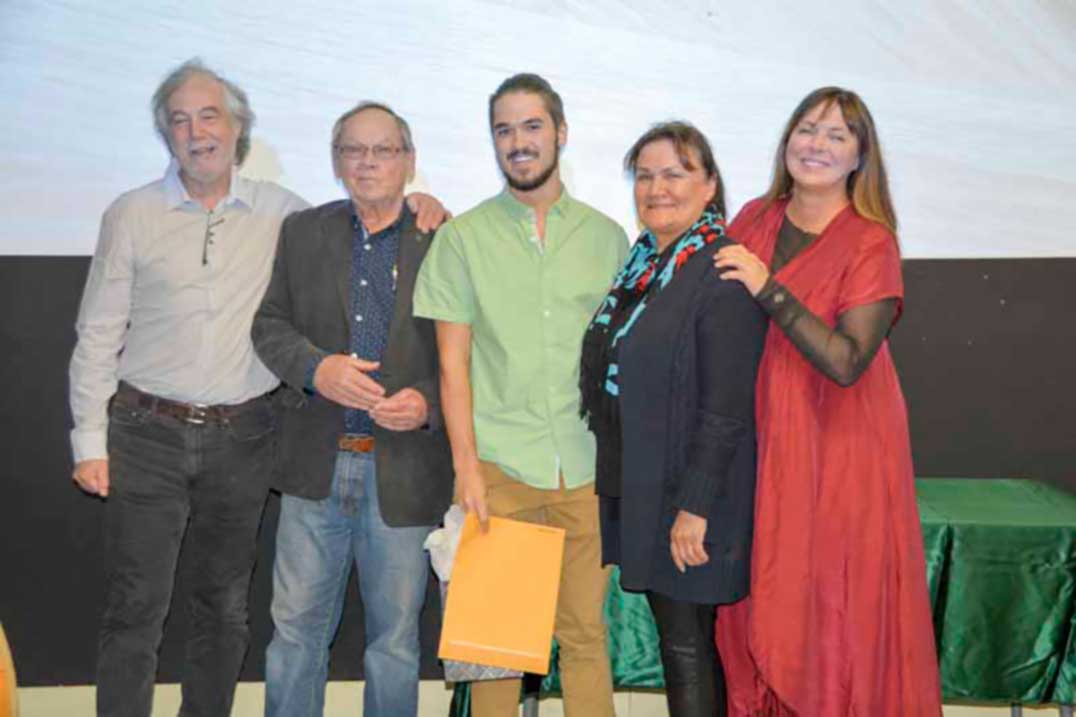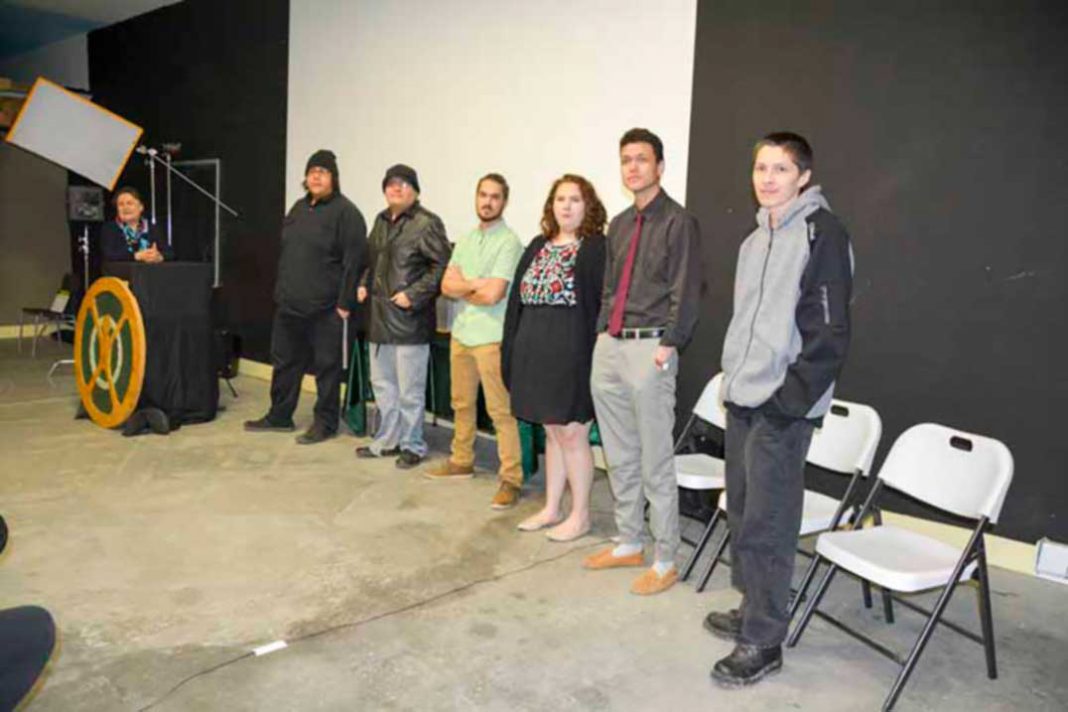M’CHIGEENG—A full house of fans of film and well-wishers gathered at Weengushk Film Institute (WFI) late last month to share in the seven Lab 1 students’ short film screening—the culmination of eight months of hard work and learning under the tutelage of some of the best in the film production industry.
Before the lights went down and the curtain rose, Dr. Shirley Cheechoo, WFI founder and executive/artistic director noted to the crowd that 2017 marked the 15th anniversary of the film institute before setting her sights on the new graduates.
“There have been many new discoveries and personal growths,” she said of the Lab 1 grads. “We witnessed tremendous learning curves and the growth of our students,” Ms. Cheechoo added, noting their determination, passion and creativity.
Ms. Cheechoo spoke of the importance of reaching indigenous youths through the arts. “Congratulations,” she added, “you are the next filmmakers and those who will tell the stories of our people.”
M’Chigeeng Chief Linda Debassige was also on hand for the screening and offered her congratulations to the film students.
“This programming instills identity to a people,” she began.
Chief Debassige noted that, as a child, she took part in a community project being offered by Ms. Cheechoo. Shy and scared at first, Chief Debassige said that being part of the project helped her to build confidence, build her as a person and as a Anishinaabe-kwe.
“Every film teaches us something we didn’t know about ourselves,” she added.
“Congratulations to you for all of your hard work,” the chief concluded, also thanking Ms. Cheechoo for her continued work and dedication.
Scott Henderson, chair of the Department of Communication, Popular Culture and Film at Brock University, through which the Lab 1 and Lab 2 certificates are offered at WFI, also attended the debut screenings.
He spoke of his pleasure at the partnership between Brock University and Weengushk Film Institute, adding that Lab 2 was approved for another year, to much applause.
“It’s important work,” he said. “The expertise you learn here allows you to join the burgeoning TV and film sector.”
Mr. Henderson explained that, several years ago, he attended Cinefest Sudbury where he was asked to meet a group of film students at Weengushk. Believing he was going to be asked to critique some films, as per usual and with an eye roll, he went to the meeting. “They were not the usual group of students, and they stuck with me,” he said. “It was a very important meeting for me.”
“It’s significant that we hear your stories, your voices, your views of the world around us as youth, indigenous youth and as Northerners, or however you view yourself,” Mr. Henderson added. “It lets people know that these people’s future is much brighter than the ones we imagine.”
Ms. Cheechoo then introduced instructors Phyllis Ellis (two Gemini Awards, two films premiering at the Sundance Film Festival and plenty of US screenwriting awards) and producer Patrick Cassavetti (Brazil, Waterland, Fear and Loathing in Las Vegas) who in turn introduced the students, Joshua Yesno, Isaac Kakegamic, Jonathan Zagula, Jasminn Jacko, Nolan Moberly and Brian Fowler. Missing from the event was student Zander Metz.
Bob Bateman, a member of the WFI board, also gave his well-wishes to the students and spoke to the importance of Northern Ontario as “the place” to go for filmmaking.
The first film screened was the moving documentary ‘Outnumbered but not Outfought’ that told the story of First Nations war hero Charles Byce through the lens of his elderly brother.
The next film, ‘Fire Birds,’ was a WFI collaboration among Sault Ste. Marie high school students about an all aboriginal squad of water bombers filled with tongue-in-cheek innuendos about First Nations culture, like bingo and scone, all played to the score of Foreigner’s ‘Don’t Stop Believin.’ A very funny film.
‘Disconnection’ by writer/director Joshua Yesno gave a frightening glimpse of a sterile, dystopian world where technology rules.
The film ‘Reclamation’ by writer/director Isaac Kakegamic was another haunting tale of a woman and boy living in what could be described as a post-apocalyptic world where boogeymen do exist.
‘This Time’ by writer/director Jonathan Zagula utilizes many different camera techniques to tell the tale a time-traveller creating rips in time while trying to find the woman he loves, risking life and sanity in the process.
‘The Way of the Honest Man’ by writer/director Nolan Moberly tells the tale of a bank robbing couple and their swindler brother through the eyes of the young boy whose face is the only one the viewer sees and who is taking in much more than the family knows…
‘Venture in Wager’ by writer/director Brian Fowler is the hilarious story of one man’s day gone horribly wrong while gambling his paycheque away at an underground casino run by some rather unsavory characters.
The film ‘I Slept with the Devil’ was writer/director Zander Metz’s take on the 1970s grindhouse genre that saw a young woman enslaved by the devil himself.
‘Treble’ by Birch Island’s Jasminn Jacko gave the audience a glimpse into the life of a budding young pianist facing adversity through her alcoholic, unsupportive and angry parents (played by Dylan and Ashley Whyte of Gore Bay) but succeeding despite these obstacles.
The films brought the viewers through a wide range of emotions through the level of acting, thanks to an amazing group of area volunteers, sophisticated camera techniques, a great musical score and the students’ own imaginations. Keep reading those credits; you’re sure to find the names of these bright young filmmakers among them in the years to come.






